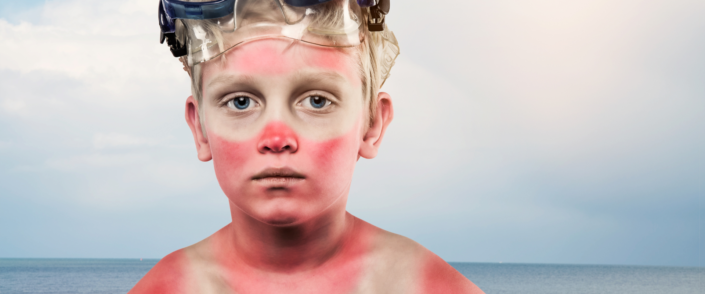Sunburn in childhood increases the risk of developing skin cancer
If you help children to develop good sunscreen habits from an early age you are protecting them from skin problems later on in life. Make it part of your routine to apply sunscreen in the morning before you leave for work, school or preschool and put sunscreen in the children’s bags so that they can apply it during the day.
Of course, you need to help younger children apply sunscreen so that they are well protected, but you should also ensure that young adults take responsibility for covering up too.
Facts
Research suggests that approximately 90% of melanoma cases can be linked to exposure to ultraviolet (UV) rays from natural or artificial sources, such as sunlight and indoor tanning beds. Therefore protection of the skin is important in the fight against melanoma. Melanoma is the most deadly form of skin cancer. It develops in the skin’s pigment cells, known as melanocytes, and can spread via the blood and lymphatic system to distant organs like the lungs, liver and brain.
Follow these tips:
- Sunscreen:
- Generously apply sunscreen to all exposed skin, even on cloudy days and all year-round.
- Use a sunscreen that provides a broad spectrum protection from both UVA and UVB rays and has a sun protection factor (SPF) of at least 30.
- Use approximately one big dollop of sunscreen (a shot-glassful) and apply it approximately 15 minutes before exposure to the sun. Then, reapply every two hours and especially after swimming or sweating.
- Also, change your daily moisturizer and hand cream to one which contains sunscreen.
- Sunscreen is just one part of sun safety and just because you’re wearing sunscreen, doesn’t mean that you can spend unlimited time in the sun.
- Wear protective clothing
- Wear a long-sleeved shirt, pants, a wide-brimmed hat and sunglasses, when possible.
- Seek shade when possible
- Remember that the sun’s rays are the strongest between 10 a.m. and 4 p.m.
- Use extra caution near reflective environments
- Water, snow and sand reflect and magnify the damaging rays of the sun, increasing your risk of sunburn.
- Do not burn
- Severe sunburns, especially during childhood, increase your risk of developing melanoma and other skin cancer. Just one blistering sunburn can double your chances of developing melanoma later in life.
- Avoid intentional tanning and indoor tanning beds!
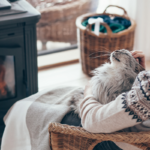
Winter Safety Guide
Winter’s arrival brings with it a desire to snuggle up and stay warm in the comfort of our homes. Fireplaces, gas and electrical blankets, heaters, and hot water bottles become our trusted companions during these chilly months. However, it’s crucial to prioritize safety to prevent potential accidents or hazards. In

Sudden Infant Death Syndrome (SIDS)
Sudden Infant Death Syndrome, or SIDS, is a heartbreaking tragedy that affects thousands of families each year. As a parent, the thought of losing your child to SIDS can be overwhelming and scary. But there are steps you can take to reduce the risk of SIDS and be prepared for
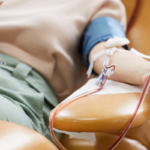
World Blood Donor Day 2023: “Give blood and keep the World beating”
Did you know that blood donation is one of the most selfless and impactful things you can do for your community? It’s true! And in South Africa, the need for blood donors is always high. That’s why today, I want to share with you some of the many reasons why
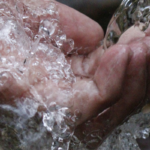
First Aid for Burns – a must read for every parent
Sister Catherine Rodwell sheds light on the right way to handle burns, be it in children or adults. It’s crucial to be aware of the proper procedure to not worsen the burn’s impact. From 6-12 May, National Burns Awareness Week is being observed. In continuation of our conversation with “Mommy
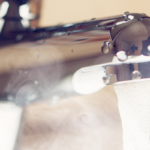
A mother recounts her traumatic experience
We are very grateful for this mommy who wanted to share her traumatic story with us, so that other parents can learn how quickly accidents can happen. Please note that photo’s can be triggering. We are very grateful for this mommy who wanted to share her traumatic story with us,

The Leading Cause of Accidental Poisoning
As parents or caregivers, keeping children safe is our top priority. However, despite our best efforts, accidents can happen. One of the most common accidents that can be prevented is unintentional poisoning from medication. It’s important to understand that medicines are not sweets and should be treated with care. In

Head Injuries in Children
The World Head Injury Awareness Day falls on March 20th every year and it looks at the number of people who suffer from a mild bump on their head to severe brain injury. The purpose of this day is to remind us of how we could reduce accidents and brain

Top tips for staying healthy
Here are some tips for parents to help keep their children healthy during the colder seasons. Practice good hygiene: Encourage your children to wash their hands frequently and cover their mouths when coughing or sneezing. This can help prevent the spread of germs and illnesses. Dress appropriately for the weather:

How CPR saves lives
Knowing CPR can save someone’s life, our trauma expert, owner and founder of Survival CPR, Sister Catherine Rodwell, explains what CPR is, who can do and why it is so important that anyone (especially those in any caregiving role such as a parent or nanny) should take a course and keep


